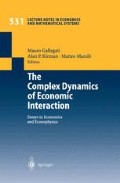Abstract
We analyse the process of coalition formation in which agents’ expectations evolve through repeated interactions in a large population setting. The selection of equilibrium outcomes strongly depends on agents’ initial beliefs and individual learning speed; the efficient coalition structure is reached starting from a very limited set of initial beliefs.
We thank C. Bianchi, C. Casarosa, E.M. Cleur, L. Fanti, N. Salvadori, P. Vagliasindi and all participants to seminars delivered at the University of Pisa and Venice for helpful comments; none of them is responsible for what is written here. This work has been accomplished with MURST national funds (40%).
Access this chapter
Tax calculation will be finalised at checkout
Purchases are for personal use only
Preview
Unable to display preview. Download preview PDF.
References
Bernheim, B. D., B. Peleg and M. D. Whinston (1987). “Coalition-Proof Nash Equilibria: Concepts”. Journal of Economic Theory, 42(1), 1–12.
de Vany, A. (1996). “The Emergence and Evolution of Self-Organized Coalitions”. In Computational Economic Systems. Edited by Gilli M., pp. 25–50. Kluwer Academic.
Farrell, J. and S. Scotchmer (1988). “Partnerships”. Quarterly Journal of Economics, 103(2), 279–97.
Fiaschi, D. and P.M. Pacini (1998). “Endogenous Coalition Formation with Identical Agents”. Working paper n 308 (Progetto d’Ateneo: L’economia italiana e la sua collocazione internazionale: una redifinizione delle politiche di welfare e dell’occupazione per una piu efficiente crescita economica), Dipartimento di Scienze Economiche, Università degli Studi di Bologna.
Gale, J., K. G. Binmore and L. Samuelson (1995). “Learning to be Imperfect: the Ultimatum Game”. Games and Economic Behaviour, 8, pp.56–90.
Greenberg, J. (1990). The Theory of Social Institutions. An Alternative Game-Theoretic Approach. Cambridge University Press, Cambridge, UK.
Guesnerie, R. and C. Oddou (1988).“Increasing Returns to Size and Their Limits.” Scandinavian Journal of Economics, 90, 259–73.
Mailath, G. J. (1998). “Do People Play Nash Equilibrium? Lessons From Evolutionary Game Theory”. Journal of Economic Literature, Vol. 36, September, 1347–1374.
Author information
Authors and Affiliations
Editor information
Editors and Affiliations
Rights and permissions
Copyright information
© 2004 Springer-Verlag Berlin Heidelberg
About this paper
Cite this paper
Fiaschi, D., Pacini, P.M. (2004). Coalition Formation with Boundedly Rational Agents. In: Gallegati, M., Kirman, A.P., Marsili, M. (eds) The Complex Dynamics of Economic Interaction. Lecture Notes in Economics and Mathematical Systems, vol 531. Springer, Berlin, Heidelberg. https://doi.org/10.1007/978-3-642-17045-4_19
Download citation
DOI: https://doi.org/10.1007/978-3-642-17045-4_19
Publisher Name: Springer, Berlin, Heidelberg
Print ISBN: 978-3-540-40497-2
Online ISBN: 978-3-642-17045-4
eBook Packages: Springer Book Archive

